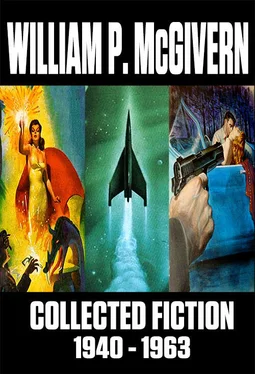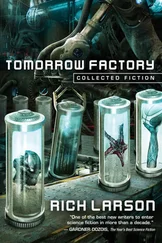Уильям Макгиверн - Collected Fiction - 1940-1963
Здесь есть возможность читать онлайн «Уильям Макгиверн - Collected Fiction - 1940-1963» весь текст электронной книги совершенно бесплатно (целиком полную версию без сокращений). В некоторых случаях можно слушать аудио, скачать через торрент в формате fb2 и присутствует краткое содержание. Год выпуска: 2014, Издательство: Jerry eBooks, Жанр: Ужасы и Мистика, Фантастика и фэнтези, Детектив, Прочие приключения, на английском языке. Описание произведения, (предисловие) а так же отзывы посетителей доступны на портале библиотеки ЛибКат.
- Название:Collected Fiction: 1940-1963
- Автор:
- Издательство:Jerry eBooks
- Жанр:
- Год:2014
- ISBN:нет данных
- Рейтинг книги:3 / 5. Голосов: 1
-
Избранное:Добавить в избранное
- Отзывы:
-
Ваша оценка:
- 60
- 1
- 2
- 3
- 4
- 5
Collected Fiction: 1940-1963: краткое содержание, описание и аннотация
Предлагаем к чтению аннотацию, описание, краткое содержание или предисловие (зависит от того, что написал сам автор книги «Collected Fiction: 1940-1963»). Если вы не нашли необходимую информацию о книге — напишите в комментариях, мы постараемся отыскать её.
Collected Fiction: 1940-1963 — читать онлайн бесплатно полную книгу (весь текст) целиком
Ниже представлен текст книги, разбитый по страницам. Система сохранения места последней прочитанной страницы, позволяет с удобством читать онлайн бесплатно книгу «Collected Fiction: 1940-1963», без необходимости каждый раз заново искать на чём Вы остановились. Поставьте закладку, и сможете в любой момент перейти на страницу, на которой закончили чтение.
Интервал:
Закладка:
Trooper O’Leary’s report had come in a half hour ago. Within minutes the turnpike had been transformed into a hundred-mile trap; every patrol had been alerted, every interchange had been instructed to watch for the white Edsel station wagon. But so far there was no trace of the killer. Patrols had stopped three Edsels, but in each case the passengers were above suspicion — a carload of college girls, a Texan with a wife and four children, and four Carmelite nuns being transported at a stately speed by an elderly Negro chauffeur.
Royce looked at the big clock on the wall above the dispatcher’s desk. It was eight-ten. The Presidential convoy would swing onto the pike at nine-forty. In just ninety minutes...
Sergeant Tonelli looked up lit him and said, “Trooper O’Leary asks permission to speak to you, sir.”
“Where is he?”
“At Interchange Twelve.”
This was twenty-eight miles from Howard Johnson’s No. 1. The killer might be miles beyond that now; he’d beer gone from the Howard Johnson’s more than forty-five minutes. “I’ll take it in my office,” Royce said, and went with long strides to his desk. As he lifted the receiver he saw that it had begun to rain; the turnpike flashed below his windows, and he could see the slick gleam of water on the concrete and the distorted glare from long columns of headlights.
“This is Captain Royce. What is it, O’Leary?”
“Just this, sir. He’s had time to make Exits Twelve or Eleven by now — if he’s thinking about getting off the pike.”
“What do you mean, if? What else could he be thinking about?”
“He made a mistake taking a white Edsel. Maybe he’s realized it. Also he took it from the middle of a row of cars which gave us a lead on it. Maybe he’s realized that too. My guess is he won’t try to get off the pike in that car. I think he’ll try to ditch the Edsel before making a break.”
“Hold on a minute.” Royce glanced quickly at the turnpike map which covered one wall of his office. The interchanges were marked and numbered in red, the Howard Johnson’s restaurants in green. Captain Royce saw instantly what O’Leary meant — before Exit 12 there was another Howard Johnson’s restaurant and service area. This was designated Howard Johnson’s No. 2; it was only twelve miles from No. 1. The killer might have driven only from No. 1 to No. 2; with the fifteen-minute head start he could have made it comfortably — and found another car.
“O’Leary, get back to Number Two on the double. Tonelli will dispatch help.”
VII
Harry Bogan had done as O’Leary had guessed — driven the white Edsel station wagon only as far as Howard Johnson’s No. 2, then abandoned it in the parking lot. Now he stood in the shadows, watching the activity at the gas pumps, a slocky, powerful figure, with the light glinting on his thick glasses and the rainy wind brushing the wiry ends of his gray crew cut. He was smiling faintly, foil lips softly curved, large mild eyes bright with excitement. The police would be sniffing around the exits now, he knew, the long blue-and-white patrol cars lined up like hungry cats at a mousehole. Waiting to pounce.
Bogan knew he had made a mistake in taking the white Edsel station wagon, but he hadn’t time to be choosy. The important thing was to get away from the area where he had left the Buick. But now he could be more discriminating. He had special requirements, and he was prepared to wail until they were satisfied. Time wasn’t important, and in that lay his safety. The police would think he was frantic, ready to bolt at the first whiff of danger. But that wasn’t the case. The feeling of power and control sent a heady flash of warmth through his body.
He heard the thin cry of a siren on his right, the sound rising and Tailing like the howl of an animal. On the turnpike he saw the red beacon light of a police car sweeping with brilliant speed through the orderly lanes of traffic. And he heard other sirens approaching on his left. The first patrol car made a u-turn over the grass strip that divided the turnpike and swerved into the restaurant service area. An attendant coming from the gas-station office stopped within a few feet of Bogan to watch the patrol car flash past the pumps and pull to an expert stop at the parking area in front of the bright restaurant.
Bogan was amused. He said, “Seems to be in a hurry, doesn’t he?”
The attendant glanced toward Bogan’s voice, but saw only the suggestion of a bulky body in the shadow. “Looks like it,” he said.
Bogan recognized the trooper; it was the one who had been simpering at the dark-haired waitress from whom he had bought his coffee and hot dog. Watching him stride along the row of parked cars gave Bogan a curious flick of pleasure. The attendant said, “Well, he’s safer driving at a hundred than most guys are at fifty. That’s Dan O’Leary, and he can really handle that heap.”
The attendant returned to the gas pumps, and Bogan continued his patient examination of the cars lining up for service. He soon found what he wanted, an inconspicuous Ford sedan driven by a young man with horn-rimmed glasses. A college boy, Bogan guessed, noting a bow tie and crew-cut blond hair. This would do nicely. The car was like one of thousands rolling along the pike, and the boy looked intelligent. That was important. There was a lot to explain, and it would be tiresome explaining things to a fool.
By then two more patrol cars had arrived. The troopers had joined the one called O’Leary. Bogan saw. And O’Leary was standing beside the white Edsel, inspecting it with his flashlight. Bogan laughed softly. They thought they were so clever; strutting pompous fools with their uniforms and guns. They’d learn nothing from the big white station wagon. He had parked it off by itself; no one had seen him leave it. They could rip it to pieces, and it would tell them nothing. They had no way to identify him, no way to know what kind of car he would presently ride off in.
The young man was paying for his gas now, and Bogan moved slowly from the shadows. This would require nice timing, he realized. The attendant gave the young man his change and walked back to the next car in line. The young man rolled up his window and started the motor.
Bogan opened the door just as the car began to move. He slid onto the front seat and showed the young man his gun. “Now let’s go,” he said quietly. “We’ve got a nice little ride ahead of us.”
Part Two
Somewhere on the highway a maniac was loose with a beautiful hostage.
VIII
“I didn’t really mean to kill them,” Bogan said a few moments later as they were rolling smoothly along the pike. The young man’s name was Alan Perkins, and Bogan had instructed him to drive in the slow, right-hand lane at about forty-five miles an hour. It was dark and windy outside, with rain spattering through the headlights, but the interior of the car was snug and warm. Bogan felt grateful and at peace with himself as he studied the reflection of his teeth and glasses in the windshield. The young man, Perkins, would be pleasant company. He had a clean, immature face, and was dressed neatly in tweed jacket worn over a sweater. Very polite and obedient, Bogan thought, with his bow tie and glasses, and thin white hands grasping the steering wheel. He drove with care, hunched forward slightly, and never letting his eyes flick toward the gun gleaming in the dashboard light.
In a careful voice the young man said, “If you didn’t mean to kill them, perhaps the best thing would be to tell the police about it.”
Bogan smiled, admiring the sudden emerging brightness of his big, white teeth. “No, that wouldn’t be the best thing. There’s no need to tell the police anything.”
Читать дальшеИнтервал:
Закладка:
Похожие книги на «Collected Fiction: 1940-1963»
Представляем Вашему вниманию похожие книги на «Collected Fiction: 1940-1963» списком для выбора. Мы отобрали схожую по названию и смыслу литературу в надежде предоставить читателям больше вариантов отыскать новые, интересные, ещё непрочитанные произведения.
Обсуждение, отзывы о книге «Collected Fiction: 1940-1963» и просто собственные мнения читателей. Оставьте ваши комментарии, напишите, что Вы думаете о произведении, его смысле или главных героях. Укажите что конкретно понравилось, а что нет, и почему Вы так считаете.

![Уильям Макгиверн - Завтра опять неизвестность [английский и русский параллельные тексты]](/books/35168/uilyam-makgivern-zavtra-opyat-neizvestnost-angli-thumb.webp)









